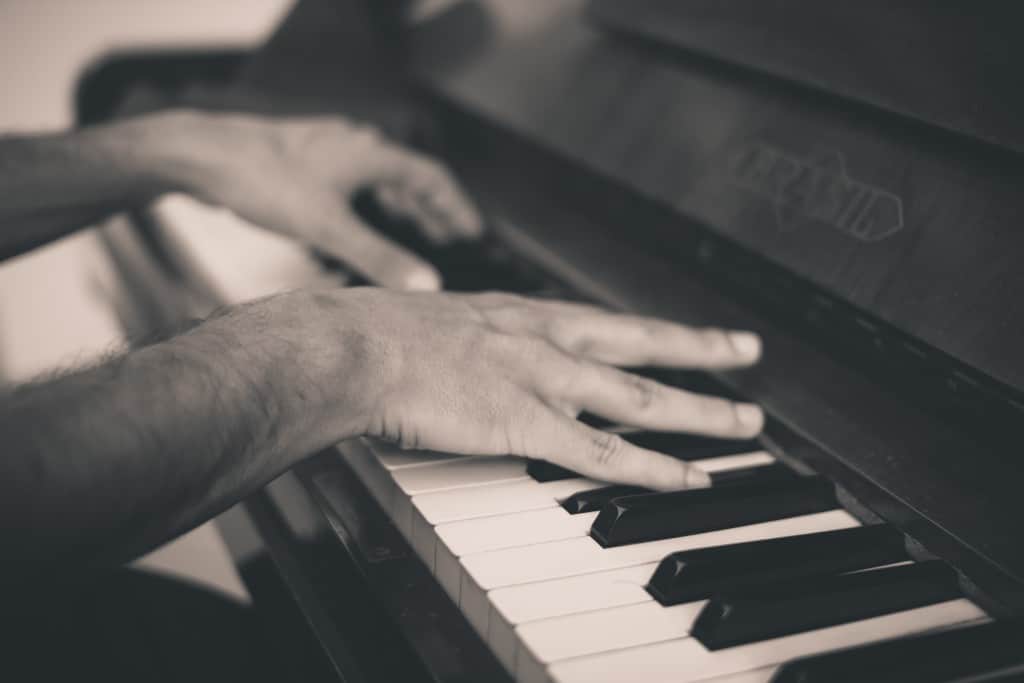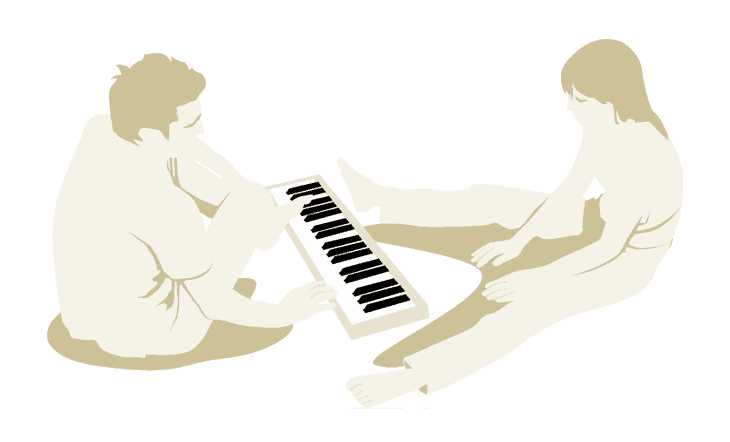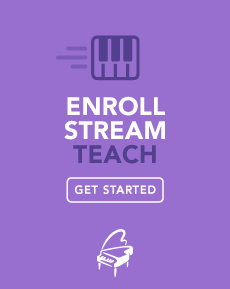
I was a beginner when I started Simply Music lessons. I had a lot of confidence issues with my musicality. I had tried to play the piano on my own for about a year and just couldn’t get it! I could not coordinate my hands; I could kind of make out the reading of music for the higher notes but was completely at a loss for the lower notes. It felt hopeless. Then of course along came Simply Music. My first experience to learning was in a group environment. I was scared, but being in a group made it so much easier. I saw that everyone had questions, everyone was unsure about their musical abilities; we all just wanted to play the piano. For me everything about this method just made sense, you put your thumb on this white key next to the group of two black keys, press down your middle finger, then skip to your pinky and run down four fingers, and there is the first pattern of your first song! Just by doing that my confidence soared. I also realized some in my group had played or had lessons before, but some of them were struggling with this. It made me glad that I didn’t know anything; there was nothing in my way. I also found that if I wasn’t the first one at the so-called piano “Hot seat”, I could observe what the person was doing, I could do those patterns in my fingers on my knee, if the student made a mistake I learned what not to do, and so by the time it was my turn, it didn’t feel like the hot seat. I could already do the pattern, it really made me feel great and these baby steps, little by little, helped my confidence to grow.
Just Being Human
At Simply Music we believe everyone is profoundly musical, without exception. There are plenty of examples to verify that; just a few would be the even rhythm of our walk, the beating of our hearts, or our ability to talk. Just take look at the sentence “the ability to talk”. If we take the words and put them into the musical notation called Rhythm, we’ll see that what we do in speech is rhythmically advanced. Yet we do that naturally, thoughtlessly; it’s just part of being a human being. Beginning students often wonder how they will be able to coordinate playing two hands together. Keep in mind as we are walking out from a movie, and having a conversation, here we are easily doing multiple things at once. We are walking to a steady left, right, left, right beat and having a conversation, showing an advanced mastery over the language of rhythm without even giving it a second thought. My first thought for any beginning student, or anyone considering starting Simply Music lessons, would be to understand that by simply being human you already have all the tools you need to learn piano. All you need now is a great method to bring that musicality onto the keyboard. My first thought on building confidence is “buying in”.
Buying In
What does that mean? Let’s use a sports analogy for this. We hear this term all the time, especially when a new coach is taking over a team that just had a bad year with a losing record. The most important thing to begin with for the athletes is to buy in to the system and coaching style that is being implemented. The more they buy in to this philosophy/method the better their chance of success. You build trust by seeing the results once you’ve done what the coach has asked; success breeds confidence. In this case not only do you have a coach at your weekly lesson, but you also have Neil on screen to be your coach at home. In the beginning your confidence builds by following directions and hearing the results. I ask my students if they are coachable, and of course everybody says yes. My experience is kids and adults are really good at what we call “selective coaching”. Selective coaching is, “Yes, I’m coachable, if I completely understand, if I totally agree, and if it’s completely convenient. If I don’t understand or agree or it’s not convenient, then I’ll just do it my way”. That is selective coaching, but we are working towards developing a relationship in which the results we promise are based on following the coaching. Just by being successful, your confidence starts to soar.
Then the important thing to do is share! Play a song or two for a friend or family member. Sure you may feel shy, but imagine the look on their face when you tell them you’ve only had a few lessons; they will be amazed. In many piano lessons students may not be able to sit down and play a song for quite some time, and here you are playing pop, classical, blues and accompaniment pieces from your very first lessons!

The Group Setting
Sometimes folks will hear mention of group lessons and their first thought is, “I don’t want to play in front of anyone.” Let’s talk about the many reasons learning in a group environment can build your confidence straight away. From your very first lesson you are observing other students playing in front of you and you see everyone is nervous; it’s ok to be a little shy. If you hear 2 or 3 students ahead of you playing their songs and they make a mistake or two, it just seems normal (because it is) and it frees you up. Conversely in a private lesson you might feel as though there is something wrong with you.
There are so many benefits to learning in a group setting that builds confidence for beginning students. Think back to how you learned most things in life. School, for instance, is taught in a group setting, so it’s really a natural way to learn piano. Firstly, when having a private lesson, if you are having trouble grasping a concept sometimes you can feel stupid, but in a group setting you have the opportunity to not be in the hot seat. You have another chance to watch a student doing a pattern on the keyboard, and you get to learn from their mistakes. Imagine you are watching the student play from the middle finger to the top finger, then from the top to the bottom finger, and as you are watching you are doing this pattern on your lap. Any mistakes the other student makes benefits the rest of the group by teaching them not to do that. By the time you get to the keyboard, you already have it down. Not only that, but many times the beginning student can do better than the more advanced student with a traditional background; he doesn’t know what he doesn’t know so there can be less in the way. He just does what he was asked to do by the teacher. Another benefit to group lessons is that you get to play in front of people right away; you learn to just play through your mistakes (much like in speaking – if we flub a word we usually keep going, rather than stopping mid-sentence and going all the way back to the beginning of our paragraph). Music is really just another language and it’s important to just have that same relationship with music as we do with speech. Also many times in our group lessons we break off into pairs and work out patterns on our Practice Pads. As you are helping the other student with their patterns you are teaching. Any time you teach something you also learn it at a much deeper level. Also, guiding somebody else to that that “aha!” moment helps build your confidence.
Teaching Others
This is true if you have only had a few lessons and know only 1 or 2 songs! Teach a child, family member, significant other, friend, anyone that will listen:) Don’t worry or be afraid you will mess it up, you won’t. Just the simple act of showing another person a pattern and helping them work through that pattern on the keyboard can help you learn the song at a deeper level yourself. The better you know a song, forwards backwards etc., the more it becomes part of your subconscious, the more automatic it is, and the more confidence you will have with your own playing. Once we conducted a pilot program in a charter school for underprivileged students. We had the teachers teach the kids our method, and the students were responsible for mentoring one another. Many amazing things happened, not the least of which was that we noticed some kids who were experiencing the most social difficulties, for whatever reasons, found that through being able to play, and help other kids learn to play, their social status started to climb. The other kids looked at them differently and treated them differently. These kids started getting better grades. Can you imagine what this newfound confidence did for these kids, all because they shared their music!

Trust and Support
I used to be a personal trainer, and getting in shape can be a lot like learning to play the piano. You walk into a health club knowing what you want your body to look and feel like but you are not sure how to go about accomplishing this. At this point the client’s hopes are very high, but their confidence is quite low, usually because they have tried before and been unsuccessful, or have heard of others who have tried and failed. The reason we had so many successful clients at our club was because we provided the tools they need to achieve their results. To be successful, first you must trust in your coach; you follow his directions in the gym and at home as well as the eating plan. A very important step is having support, at home, from co-workers, family, friends, significant others. The more others in your environment are supporting, not sabotaging, your exercise, diet etc., the better your chance of success. It’s the same with piano; I’ve never met anyone who didn’t want to learn to play the piano, or regret giving it up as a kid. Just by simply sharing your music with others either by playing or teaching creates confidence, Imagine looking up after you have played a song and seeing the shock and surprise on your coworkers’ faces; you will find people LOVE to hear you play. It is also inspirational to them; listening to you play inspires them to take it on themselves.
Making Mistakes
A toddler learns to walk and has a different attitude about failing (stay with me on this now). We don’t see the toddler try and take its first step, fall down, then quit, slap the floor and say “DARN IT! I’ll never learn to walk, why even try?” Of course not, they just get back up, usually with a big smile on their face, and try again and again. They have no ego about it, no worries about looking foolish, no judgments. They are not worried about what others think. They simply just keep trying until they walk, then eventually run. Somehow as we get older we forget this. I believe we would be best served to have this same attitude with learning something new like the piano. This attitude says it’s okay to make mistakes, don’t worry if you feel foolish; just keep trying with that same smile on your face.
Playing with Others
Many people don’t realize the power of duets (where two people play together). Let’s say that you’re in piano lessons and we taught you a simple scale, we’ll call it a blues scale (with my pinky to the corner of my mouth). Imagine when you look at the piano you see black keys (in groups of 2 and 3) and white keys. You can then imagine playing connect the dots and pretend to series of triangles. Just by playing these notes in any random order, you will get a great professional bluesy sound. Better yet, let’s imagine you are at a wedding and there is a small band. You go up and ask the band to play a 12 bar blues in the key of C. Ask the piano player if he would mind letting you sit in, then you play notes from that blues scale, however you wish in any order you feel like. You would sound awesome; your friends’ jaws would drop! Now imagine yourself walking of the stage with a gigantic smile on your face. We do this exercise in class all the time (minus the band of course). I see the students’ eyes light up, a big grin comes across the parents’ faces. It’s really powerful.
The bottom line is: don’t be shy, don’t be afraid, get out there and share your music. After all it’s just music, and music is meant to be heard.







